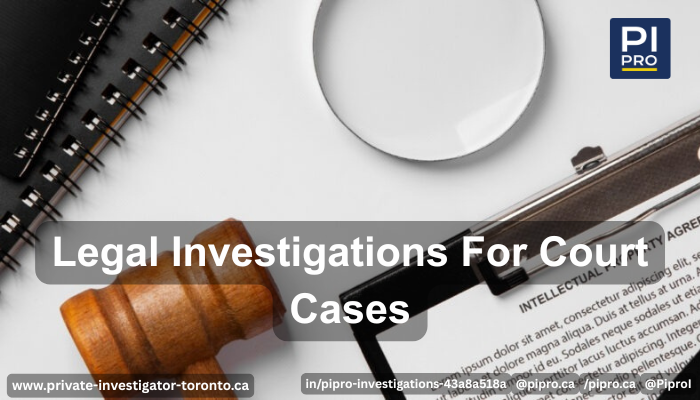
Legal Investigations for Court Cases
Legal investigations have become the lifeline of many individuals and law firms when it comes to dealing with complicated legal battles. Be it civil litigation, criminal defence or corporate fraud, the positivity of a professional investigator is that he or she can find the facts, validate claims and help in the collection of evidences. These services are essential towards creating a solid legal case as they aid both the attorneys and the clients in easing through the complicated legal system.
This article will discuss the helpfulness of legal investigations in court cases, some important legal services, and the improvement of admissible evidence gathered.
Court Cases Legal Investigations
The outcome of cases in courts is usually determined by the evidence and its quality. This is where law investigations are required. Licensed private investigators are experts at gathering facts, finding witnesses and proving claims in order to help in litigation.
Legal inquiries can include:
- Carrying out background checks of important parties
- Interviewing witnesses or locating missing persons
- Trace of secret assets or sham transactions.
- Watching the surveillance videos or performing surveillance activities
- Detecting discrepancies in testament.
Investigators can help legal teams create compelling arguments and prevent surprises at trial by offering detailed reports that are free of any biases.
Legal Support by Professional Investigation
Lawyers deal with the legal theory, the procedures of the court and advocacy- however, they frequently depend on investigators to do the work in the field. Legal investigations allow the private investigator to provide the attorney with legal services in many different ways:
-
Case Preparation:
Investigators assist attorneys in preparing hearings, depositions and trials by providing evidence to support or refute claims.
-
Subpoena Services:
Most PIs are licensed to serve subpoenas which saves law firms time and helps assure on-time delivery.
-
Fact Verification:
They validate facts given by clients, the opposing counsel or witnesses with the aim of spotting inconsistencies.
Collection of Evidence
It is arguably the most crucial role of any legal investigation to collect evidence. In a divorce, business litigation or criminal defense, the case can be won or lost on the basis of good evidence. Legal investigators understand how to collect the evidence that is:
- Relevant: Straight to the point concerning the issue of law
- Credible: Gathered using moral and legal means
- Admissible: Passes the test of evidence admissibility before a court of law
Examples of evidence that a detective can gather are:
- Pictures and videos
- Paper trail and financial documents
- Social media presence and digital footprints
- Affidavits and witness statements
- GPS track records and surveillance logs
The point is that all the evidences should be gained in a legal way. A professional private investigator is familiar with legal thresholds, chain-of-custody considerations that allow evidence to be admissible in court.
Common Legal Cases
Legal investigations are not restricted to a single kind of a legal problem. The following are some of the typical situations when investigators can be of crucial help:
-
Civil Litigation
Litigation between individuals or parties, i.e., breach of contract, property damage, personal injury often need evidence that can be found only by an experienced investigator.
-
Criminal Defense
Investigators are hired by defense attorneys to locate witnesses, locate exculpatory evidence or to poke holes in the prosecution case by performing fact-checking and surveillance.
-
Family Law
Whether it is a custody battle or alimony search, PIs can give information related to the lifestyle, finances, or any other aspect of the behavior that can be used by the court to make decisions.
-
Business and Labour Law Litigation
Investigators assist organizations in the discovery of fraud within the company, theft of intellectual property or inappropriate workers that may result in litigation.
What is the Difference between Legal Investigations and Law Enforcement?
One should draw a line between legal and police investigations. The main difference is that although law enforcement investigates crimes to prosecute the offender, private legal investigators are hired directly by the client or by an attorney and shape their investigation to fit particular legal requirements.
Private investigators unlike police:
- Have no right to arrest
- Concentrate on both civil and criminal cases
- Private individuals or law firms hire them
- Frequently penetrate more into the background checks and surveillance
This autonomy enables them to offer specialized and client-oriented legal assistance devoid of the methodological limitation experienced by the police departments.
Steps to Hiring a Legal Investigator
When you are thinking of getting a private investigator to help in a court case, then this is what you should gang:
-
Licensing and Insurance:
Make sure they have a license to work in your area and have liability insurance.
-
Legal Investigations Experience:
Select a person who is familiar with the court and litigation procedure.
-
Specialization:
Find an investigator who specializes in your field (e.g., fraud, family law or corporate investigations).
-
Transparency:
A professional investigator must be open in terms of pricing, timeframes, and legal limits.
Hiring a professional investigator does not only make your case better but also gives you an assurance that your methods of gathering evidence are lawful.
FAQs About Legal Investigations
- 1. What does legal investigation entail?
The purpose of a legal investigation is to determine facts and evidence which can sustain a legal case. At that, investigators closely collaborate with attorneys in order to bolster a claim, locate a witness, and establish the truth regarding any disputes.
- Do legal investigations qualify to be used in court?
Yes, provided the evidences are collected in a legal and ethical manner. A professional investigator will guarantee that all findings are admissible in court; that is, they are well documented, with verified sources and chain-of-custody standards.
- What is the difference between legal and police investigation?
The law enforcement conducts police investigations which are concerned with criminal prosecution. Private investigators normally conduct legal investigations on behalf of individuals or law firms that hire them to help in both civil and criminal cases.
- Does a private investigator give evidence in court?
Yes, private investigators have a right to give expert testimony or submit the evidence that they have collected in the course of investigation. Their testimony may prove relevant in establishing facts and proving your case before the court.
Conclusion:
A legal investigation is an important tool in the possession of anyone who has a case in court. Whether it is a background check, surveillance, or a full-scale evidence collection, professional investigators offer the behind-the-scenes legal assistance which frequently decides the success of a case. As a law firm, or even as an individual who believes you have a case, a good investigator can provide the clarity, documentation and peace of mind you want when in court.
Are you planning on a legal fight and require dependable assistance then our certified investigators are at your service. Call us now to discuss how we can help you with our services and make your case stronger.




